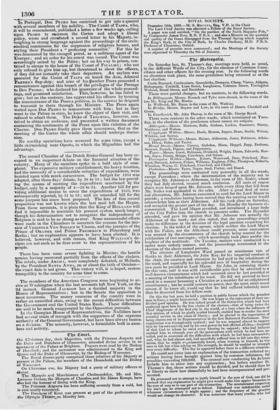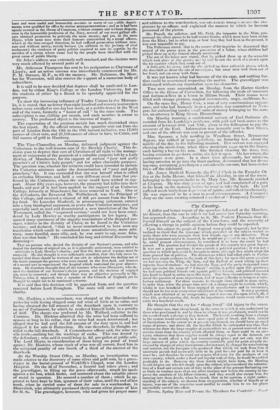ebe .
On Saturday last, St. Thomas's day, meetings were held, as usual, in the -different Wards of the City, for the election of Common Coun- cilmen and other officers for the ensuing year. In the following wards no alteration took place, the same gentlemen being returned as at the last election.
Castle Baynard, Cordtvainers, Queenhithe, Donate, Cheap, Vintry, Aldgate, Bishopsgate, Cornhill, Lime Street, Langbourn, Coleman Street, Farringdon Without, Bread Street, and Bassishaw.
There were partial changes, but no contests, in the following wards. In Billingsgate, Messrs. Hcssack and Tyler were elected, in the room of the late Mr. King and Mr. Hostin. In Walbrook, Mr. Emas, in the room of Mr. Watkins.
In Bridge, Messrs. Baynes and Law, in the room of Messrs. Chatfield and Green.
In Candlewick, Mr. John Thorne, in the room of Mr. George Beard.
There were contests in the other wards, which terminated on Tues-
day, in the election of the gentlemen whose names we subjoin. Aldersgate—Messrs. Alottram, Rolls, Godson, Larkin, Summers, Stacey,
Matthews, and Walton.
Cripplegate Within—Messrs. Hoole, Beaton, Jaques, Brass, Smith, Wilson, Wilshire, and Sutton.
Cripplegate Without—Messrs. Haines, Alderman, Jones, Robinson, Atkin- son, Dixon, Hales, and Taylor. Broad Street—Messrs. Corney, Gadsden, Moon, Heppel, Jupp, Deshons, Stewart, French, Pigeon, and Peppercorn. Tower—Messrs. Gorst, Robinson, Drinkald, Wright, Dixon, Edwards, Rus- ton, Joyce, Finnis, Briggs, Cawthorn, and Selson. Farringdon Within—Messrs. Rutter, Westwood, Daw, Pritchard, Hay- ward, Dunnett, Ashurst, Fisher, Williams, Eagleton Filby, Thompson, Roberts, Wheelton, Warne, G. Pritchard, Crawford, and Chubb. Portsoken—Messrs. Tyers, Negus, Saul, Parker, and Hoard.
The proceedings were conducted very peaceably in all the wards, except Portsoken ; where the determination of the majority not to recognize Mr. Johnson as Alderman, in the room of Mr. Scales whom they had duly elected, created much confusion. All sorts of coarse abuse were heaped upon Mr. Johnson, while every thing that fell from Mr. Scales was applauded to the echo. After a great deal of noise and altercation, Mr. Johnson consented to send for the Lord Mayor to preside ; a resolution having been carried that the meeting never would acknowledge him as their Alderman. All this took place on Saturday, and occupied the greater part of the day. On Monday the business re- commenced. The Lord Mayor presided, and introduced a large body of the City Police into the church to preserve order. The Recorder attended, and gave his opinion that Mr. Johnson was actually the Alderman of the ward ; and also stated, that the proceedings would make no difference in the decision of the legal question respectinn.6 his election. In the midst of the uproar, which neither the Lord Mayor with his Police, nor the Alderman could prevent, some amusement was created by the circumstance of the church being wanted for the celebration of two marriages ; which accordingly took place amidst the laughter of the multitude. In Tuesday, matters were conducted in a rather more orderly 'manner, and the proceedings terminated in the election of the above-named persons. The electors of Langbouni Ward passed an unanimous vott of thanks to their Alderman, Sir John Key, for his impartial conduct in the chair, the courtesy and attention he had paid to the inhabitants of the ward, and especially for his splendid acts of hospitality during the two years he presided as Lord Mayor. Sir John, in returning thanks for this vote, said it was with considerable pain that he adverted to a well-known circumstance which had occurred since he last presided at a meeting of the inhabitants of his ward. He did not pretend to have acted in a manner becoming a Christian or a member for an enlightened constituency ; but he would venture to assert, that the most strict moral censor, if he knew all, would say that he had suffered infinitely more than he deserved from his fellow-men.
On this day last year, he held a position in public favour which the proudest man in Euro..4 might have envied. He was happy in the enjoyment of their un- divided good opinion. He was indeed proud of the distinction which had been conferred upon him by the free choice of the electors—that of being twice the Chief Magistrate of the first city in the world, at a time when the influence of that station, of which be gladly availed himself, enabled him to render the most essential service to the cause of liberty ; and he gloried in the expectation of being chosen one of its Representatives in the first Reformed Parliament. That expectation was triumphantly realized; and he was tempted almost to suppose that by his own activity and by his own power be had effected all this,—forgetful of that God to whom he owed every blessing he enjoyed; who had hitherto enabled him to triumph over all the persecutions with which he had been as- sailed, and to overcome all the difficulties with which he had been surrounded; and, who, he had almost said, had mercifully suffered him to fall into this temp- tation, that he might experimentally know, when trusting to himself, be was sure to fall, but when relying on His strength, he should be enabled to triumph over every difficulty. This day he appeared before them in a different situation. He could not enter into an explanation of the transaction referred to; actions having been brought against him, by common informers, for penalties exceeding 100,000/. The counsel now conducting his defence forbade him to enter into any explanation; but before another St. Thomas's day, these actions would be decided, and he should then be at liberty to show how shamefully he had been misrepresented and per- secuted. He presumed not to attempt to justfy himself in the eyes of God, nor did he pretend that any explanation he might give would make him appear blameless in the eyes of men as to one part of the transaction. The misstatement respecting his son's age, he attempted not to defend. Falsehood was indefensible, under ivhatever circumstance it might appear ; and the frequency of the practice would not change its character. It was notorious that many youths, who had been and were useful and honourable servants in many of our ublic depart- ments, were qualified for office by similar misrepresentations ; quad as it had been openly avowed in the House of Commons, without censure and without disguise, even in the honourable profession of the Navy, several of our most gallant offi- cers obtained promotion by prdcisely the same means; awl yet, in the same House, while some men wore their honours untarnished hy.tt moral offence, which at the time escaped detection, he had suffered persecution without mea- sure and without mercy, merely because (in addition to the jealousy of rival tradesmen) the virulence of party politics required to sate its appetite by the sacrifice of a victim whose name had by the people been identified with the great cause of public liberty.
Sir John's address was extremely well received, and the electors were very much affected by several parts of it.
Mr. Alderman Thompson has sent in his resignation as Chairman of Lloyd's ; and an active canvass was immediately commenced for Mr. P. M. Stewart, M. P., to fill the vacancy. Mr. Robinson, the Mem- ber for Worcester, will also receive the support of a numerous body of subscribers.
It is said to be now decided that degrees shall be conferred in Lon- don, not by either King's College or the London University, but on the students of either by a Board to be specially appointed for the purpose.
To show the increasing influence of Trades Unions in the Metropo- lis, it is stated, that no fewer than eight hundred and seventy journeymen tailors were enrolled in one day last week, at a public-house at the West end of the town, formerly a "house of call" to the same trade. The subscription is one shilling per month, and each member is sworn to secresy. The professed object is the increase of wages.
The exportation of the precious metals has much diminished since the last report. By the official returns, the quantity sent out from the port of London from the 13th to the 19th instant inclusive, was 17,000 ounces of silver coin, and 27,183 ounces of silver in bars, to Calais, and 957 ounces of gold to Hamburg.

















 Previous page
Previous page